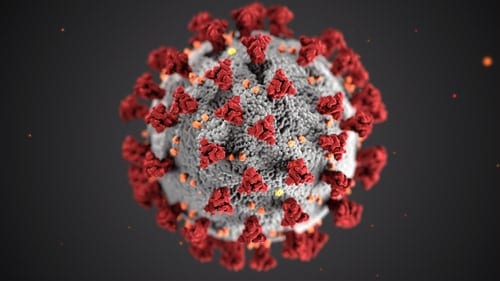You must have heard of the recent outbreak of the respiratory illness called COVID- 19. This potentially fatal illness is caused by Coronavirus, which was first detected and identified in December 2019 in Wuhan, China. And it is heart-sickening to witness from the recent reports that have shown several thousand cases of death in China and many other parts of the world, including the USA.
In this article, we will guide you with what you need to know about Coronavirus, including how it spreads and what you can do to stay safe.
What is COVID-19?
COVID-19 simply means “Coronavirus Disease,” and is a respiratory illness typically caused by severe acute respiratory syndrome coronavirus 2 (SARS- CoV-2).
The name “Coronavirus” has been derived from the way it looks under a microscope. When closely examined, this virus looked like a “crown.” And it contains a protein that is known for bulging out, from its middle point. And it does so, in every direction within your body.

After it was first identified in 2019, the COVID-19 disease spread globally, causing the 2019-20 Coronavirus pandemic.
How Does COVID-19 Spread?
COVID-19 can spread from one individual to another; specifically, if there is any close contact (within six feet) with a person infected with the same. The spread of COVID-19 commonly happens when the infected individual sneezes or coughs directly on another individual or gets in contact with them anyhow.
Also, it can spread when droplets (from sneezes, coughs, or contaminated hands) lands on diverse surfaces, and other individual touches the contaminated surfaces with his/her hands. And it further spreads when the person touches their mouth, nose, and eyes with those contaminated hands. Furthermore, it can spread like wildfire when an infected person unknowingly attends social gatherings or other events. That is when things start turning more ugly.
However, “SARS-CoV-2” seems to be spreading rapidly and sustainably in our communities all across the world.

Symptoms of COVID-19
The symptoms of COVID-19 can range from mild sickness to pneumonia. Most individuals will easily recover, and others may end up in a grave condition in a short time.
Individuals with Coronavirus may experience:
- Fever
- Flu-like symptoms such as sore throat, fatigue, and coughing.
- Shortness of breath
However, many infected individuals experience mild symptoms, while some experience more severe symptoms. And that may include coughing, difficulty in breathing, and fever.
What Are The Possible Impediments From COVID-19?
The most severe complication of the SARS-CoV-2 infection is a specific kind of pneumonia that is known as 2019 Novel Coronavirus-Infected Pneumonia (NCIP) or “Pneumonia-Associated Respiratory Syndrome (PARS).”
Results from a 2020 study of 138 individuals admitted into hospitals in Wuhan, China, with Novel Coronavirus-Infected Pneumonia (NCIP) showed that 26 percent had critical cases and needed a thorough treatment in the Intensive Care Unit (ICU).
About 4.3% of the individuals who were admitted into the Intensive Care Unit (ICU) lost their lives from this kind of pneumonia.
Till now, Novel Coronavirus-Infected Pneumonia (NCIP) is the only problem associated with the 2019 coronavirus. Scientists and researchers have witnessed the under-listed complications in individuals who have developed the virus:
- acute respiratory distress syndrome (ARDS)
- unbalanced heart rate (arrhythmia)
- cardiovascular shock
- critical muscle pain (myalgia)
- fatigue
- heart attack or heart damage
Who is More Susceptible to COVID-19?
Although anyone can get infected by Coronavirus, some people are more susceptible to contract COVID-19.
The elderly and people who have diabetes, high blood pressure, cardiovascular disease, cancer, and chronic respiratory illness are more prone to this viral illness, and often it can result in death.
What Treatments are Available?
Currently, no treatment is exclusively approved for COVID-19, although vaccines and medicines are presently under study. The study is mainly focused on controlling symptoms as the virus carries out its duty.
Therefore, a person should look for immediate medical assistance in case he/she thinks that they have COVID-19. And, your physician will recommend treatment for any complications or symptoms that you incur.
Other Coronaviruses such as MERS and SARS do have treatments and vaccines. Some available treatments for these similar COVID-19 viruses include:
- retroviral or antiviral medications
- breathing assistance, such as automatic ventilation
- steroids to minimize lung swelling
- blood plasma transfusions
How Are Coronaviruses Identified And Diagnosed?
COVID-19 can be diagnosed or identified by taking samples of saliva, blood, or tissue.
Presently, in the USA, 78 local and state public health laboratories across fifty (50) states can test for it, with a capacity to test 75,000 individuals.
Speak to a doctor straight away in case you think you have been infected with COVID-19, or if you start noticing symptoms. Your doctor will speak to the public health officials in your locality to guide whether it is necessary to test for the virus or not.

A lab expert would either take a sample of your blood with the help of a needle or might utilize a cotton swab to take a little sample of saliva or breathing secretions from the back of your throat.
The sample is then further sent to a testing facility for the confirmation of antibodies or viral material that responds to the virus.
How To Prevent COVID-19 And Stay Safe?
Presently, there is no vaccine for preventing COVID-19(Coronavirus disease, 2019).
The best way for averting COVID-19 is by avoiding being exposed to the virus. The virus spreads primarily between individuals who are in close range (typically within six feet apart). It spreads via respiratory droplets produced whenever an infected individual sneezes or coughs.
These droplets can end up landing in the nose or mouth of any individual who is nearby or can most likely inhale the same.
Below are a few tips for preventing COVID-19:
1. Wash Your Hands Often
Wash your hands frequently using soap and water for at least 20-25 seconds. Do this specifically after you must have spent time in public places, or after coughing, sneezing, or blowing your nostrils.
In case water and soap are not readily available, utilize a hand sanitizer that contains at least 60 percent alcohol. Cover all parts of your hands and rub them together until they become dry.
2. Avoid Close Contact
Always keep distance between you and other people, specially, if COVID-19 has spread in your locality. It is particularly essential for individuals who are at higher risk of contracting the disease, to keep distance or stay indoors.
3. Stay Home If You Are Sick
Stay at home if you are sick, except if you need to step out to receive extensive medical care. This way, you can help avoid the spread of COVID-19.
4. Cover Your Mouth While You Sneeze And Cough
Cover your nose and mouth with a tissue whenever you sneeze or cough. You can also utilize the inside of your elbow to do the same.
5. Throw Away Used Tissues
Dispose of every used tissue after you are done using it. And wash your hands with soap and water for a minimum of 20 seconds after that.
In case soap and water aren’t available, clean your hands with a recommended sanitizer. However, always ensure your hands are kept clean after using and throwing used tissues away.
6. Wear A Face-Mask If You Are Sick
If you are ill, you must wear a face mask when you are around others (e.g., sharing a vehicle or a room) and before entering a healthcare provider’s office.
In case you are not able to use a face mask (for instance, due to trouble with breathing), then you should always do your best to cover your mouth when you sneeze or cough. Also, people who are looking after you should always wear a face mask whenever they enter your room.
In case you are not ill, you don’t need to wear a face mask unless you are looking after someone who is sick (and they aren’t able to wear a face mask). Face masks may be short in supply right now. So, it’s wise to reserve it for the caregivers.
7. Clean And Disinfect
Clean and disinfect all frequently touched surfaces every day. It includes doorknobs, countertops, desks, keyboards, handles, sinks, faucets, and toilets.
In case surfaces are untidy and dirty, clean them: Use soap or detergent and water before disinfection.
8. Social Distancing
One technique for slowing down the spread of COVID-19 is social distancing. There are some practical things you can do to keep those susceptible to COVID-19, protected.
It is by introducing social distancing to your lifestyle. This way, you can limit your social interaction and physical contact with people.
- Households
- Cover your mouth while you cough/sneeze and hand hygiene.
- Avoid unnecessary handshakes and other physical greetings.
- Clean shared high-touch surfaces such as doorknobs, tables, and kitchen benches regularly.
- Increase the amount of fresh air by adjusting air conditioning and opening windows.
- Purchase more goods and services online so that you can limit your visit to the grocery/medicine shops.
- Social distancing in your workplace (If you are going to work and not working remotely)
To minimize the spread of COVID-19 in the workplace:
- Stay back at home in case you are ill
- Consider rescheduling, staggering, or canceling large gatherings.
- Hold meetings through phone calls or video conferencing.
Final Remark
COVID-19 is increasing rapidly, with more and more people becoming vulnerable to contracting the virus.
However, with the right preventive measures, one can stop or minimize the spread of COVID-19. They can also avoid getting infected by the virus.
Thus, you must always contact your healthcare provider in case you suspect or notice any symptoms of COVID-19 showing up.

